1. Life
Yehudi Menuhin's life was marked by extraordinary musical talent from an early age, coupled with a deep commitment to humanistic ideals that shaped his career and personal philosophy.
1.1. Early life and education
Yehudi Menuhin was born in New York City on 22 April 1916. His father, Moshe Menuhin, was a Lithuanian Jew from Gomel in modern Belarus, and through him, Yehudi was descended from a rabbinical dynasty. His mother was Marutha (née Sher), a Crimean Karaite. Moshe and Marutha met in Ottoman Palestine before marrying in New York in 1914. In late 1919, they became American citizens and changed the family name from Mnuchin to Menuhin. Moshe Menuhin was also known as an anti-Zionist Jewish philosopher and served as the head of Hebrew education for Temple Emanu-El. Menuhin's sisters were Hephzibah Menuhin, a concert pianist and human rights activist, and Yaltah Menuhin, also a pianist, as well as a painter and poet. Both sisters often performed and recorded chamber music with their brother.
Menuhin's first violin instruction began at age four with Sigmund Anker. His parents initially sought out Louis Persinger, who eventually agreed to teach him. Menuhin took lessons from Persinger at his Hyde Street studio. He also received tutelage from renowned musicians such as the Romanian composer and violinist George Enescu in Paris, and Adolf Busch in Basel, Switzerland, where he resided for over a year, also studying German and Italian. While he had one lesson with the Belgian virtuoso Eugène Ysaÿe, Menuhin found Ysaÿe's teaching method and advanced age unsuitable.
1.2. Early career
Menuhin made his first public solo appearance in November 1921 at a pupil's concert. His formal debut followed on 29 February 1924, at the Oakland Auditorium, which included a solo performance with the San Francisco Symphony Orchestra under the direction of Alfred Hertz and a recital at the Scottish Rite Hall. At the age of seven, in 1923, Menuhin appeared as a solo violinist with the San Francisco Symphony Orchestra. His reputation quickly grew, preceding his New York debut on 17 March 1926, at the Manhattan Opera House.
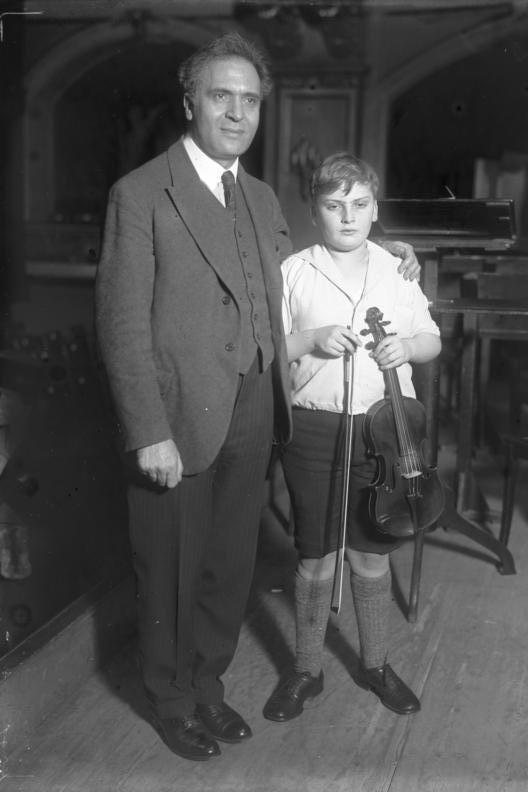
Persinger accompanied Menuhin on the piano for his first solo recordings in 1928-29. Menuhin rapidly rose to international fame as a child prodigy in the 1920s. At the age of twelve, in April 1929, he performed the Bach, Beethoven, and Brahms violin concertos at the Semperoper in Dresden and with the Berlin Philharmonic under Bruno Walter in Berlin, receiving rapturous responses. A critic from the Berliner Zeitung remarked on his charming stage presence and astonishing musicality, stating: "There steps a fat little blond boy on the podium, and wins at once all hearts as in an irresistibly ludicrous way, like a penguin, he alternately places one foot down, then the other. But wait: you will stop laughing when he puts his bow to the violin to play Bach's violin concerto in E major no.2."
His first concerto recording was made in 1931, Bruch's G minor, under Sir Landon Ronald in London. In 1932, he recorded Edward Elgar's Violin Concerto in B minor for His Master's Voice in London, with the composer himself conducting. In 1934, he recorded Paganini's D major Concerto with Emile Sauret's cadenza in Paris under Pierre Monteux. Between 1934 and 1936, he made the first integral recording of Johann Sebastian Bach's sonatas and partitas for solo violin.
Menuhin's deep interest in the music of Béla Bartók led him to commission a work from the Hungarian composer. Bartók, who was suffering from poverty and illness, composed the Sonata for Solo Violin (completed in 1943), which was his penultimate work and dedicated to Menuhin. Menuhin premiered the piece in New York in 1944.
1.3. World War II musician
During World War II, Menuhin actively performed for Allied soldiers, demonstrating his commitment to supporting the war effort through music. In a profound display of humanitarianism, in June and July 1945, he performed for the surviving inmates of several concentration camps after their liberation, most famously Bergen-Belsen, where he was accompanied on the piano by English composer Benjamin Britten.
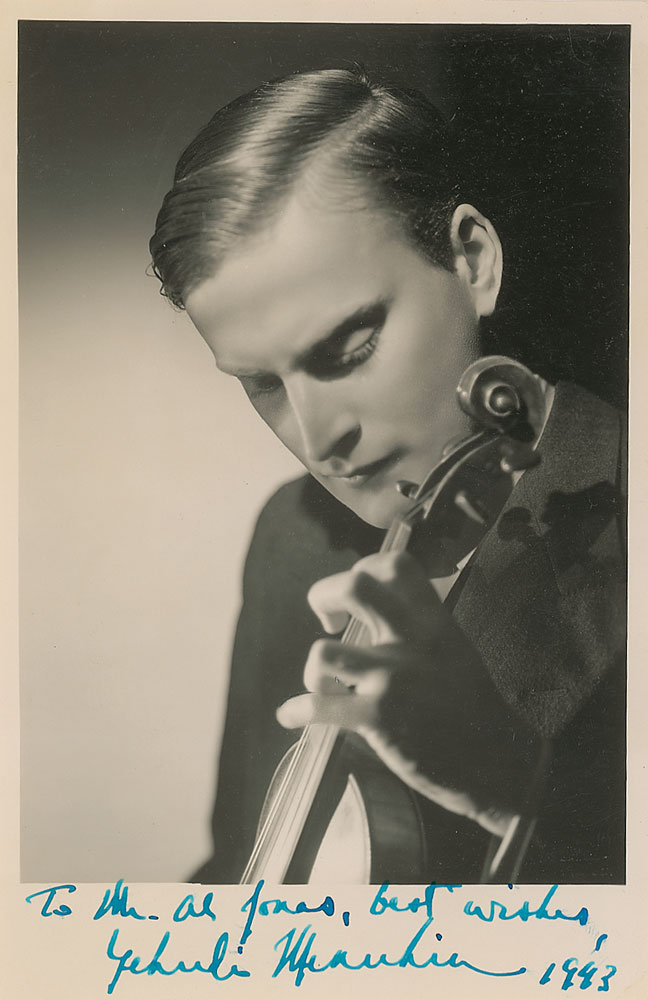
Following the war, in 1947, Menuhin returned to Germany to perform concerto concerts with the Berlin Philharmonic under Wilhelm Furtwängler. This act of reconciliation was particularly significant as he was the first Jewish musician to do so in the wake of the Holocaust. Despite facing criticism from some Jewish communities, Menuhin stated his intention to help rehabilitate Germany's music and spirit, emphasizing the importance of healing and moving forward. His decision to perform in post-war Germany, alongside a conductor who had remained in the country during the Nazi era, was a controversial but deeply principled stance, leading him to base his activities primarily in Britain due to the backlash from some parts of the American music establishment.
2. Major activities and achievements
Menuhin's influence extended far beyond his virtuosity as a violinist, encompassing significant contributions as a conductor, an advocate for international understanding, and a dedicated patron of music education and charity.
2.1. Violinist
Menuhin's career as a violinist spanned nearly seven decades, cementing his reputation as one of the 20th century's most celebrated performers. His recording contract with EMI lasted almost 70 years, making it the longest in music industry history. He made his first recording at age 13 in November 1929 and his last in 1999, shortly before his death. Over this period, he recorded more than 300 works for EMI, both as a violinist and a conductor. In 2009, EMI released a 51-CD retrospective titled Yehudi Menuhin: The Great EMI Recordings, followed by Warner Classics' 80-CD collection The Menuhin Century in 2016, curated by his long-time friend Bruno Monsaingeon.
He collaborated with a wide array of musicians and composers. He gave the first performance of William Walton's Violin Sonata in Zürich in 1949, alongside Louis Kentner. Menuhin also cultivated a deep friendship and professional association with Ravi Shankar, beginning in 1952. Their collaboration led to a joint performance at the Bath International Music Festival in 1966. Menuhin served as artistic director of the Bath Festival from 1959 to 1968. Their collaboration also led to the recording of their Grammy Award-winning album West Meets East (1967). He also commissioned composer Alan Hovhaness to write Shambala (c. 1970), a concerto for violin, sitar, and orchestra, which is considered the earliest known work for sitar with a Western symphony orchestra. In the 1970s, he collaborated with jazz violinist Stéphane Grappelli on the album Jalousie, featuring duetting violins. Menuhin also commissioned and premiered Priaulx Rainier's violin concerto Due Canti e Finale at the Edinburgh Festival and her final work, Wildlife Celebration, performed in aid of Gerald Durrell's Durrell Wildlife Conservation Trust.
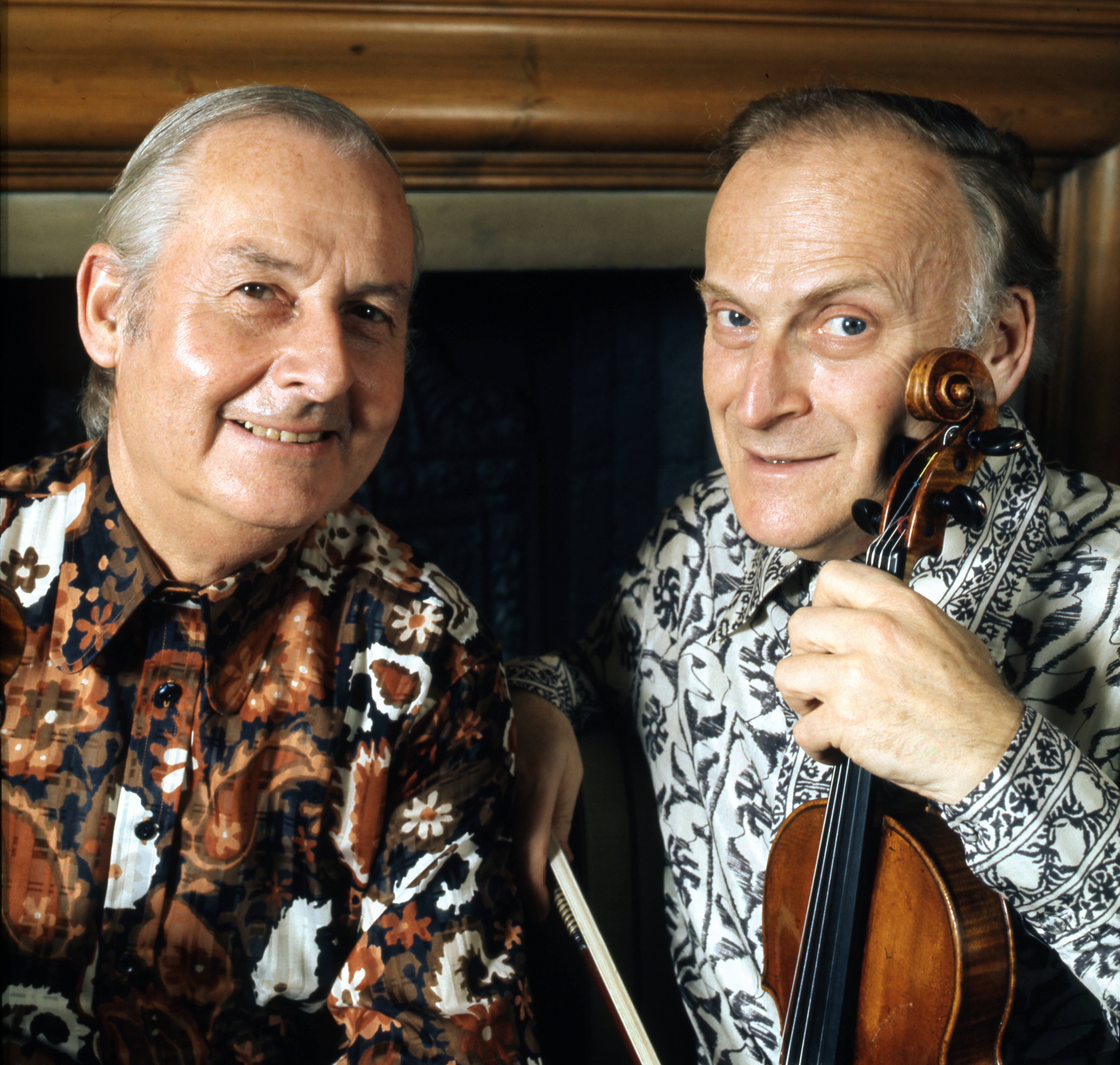
Menuhin frequently returned to the San Francisco Bay Area, performing with the San Francisco Symphony Orchestra. A particularly memorable later performance was of Edward Elgar's Violin Concerto. In 1978, he performed Pick Yourself Up with Stéphane Grappelli as the interval act for the 23rd Eurovision Song Contest. In 1980, he hosted the PBS telecast of the gala opening concert of the San Francisco Symphony from Louise M. Davies Symphony Hall. He is also credited with discovering, publishing, and performing previously unreleased works by Felix Mendelssohn, including the Violin Concerto in D minor and the Violin Sonata in F major.
2.2. Conductor
Menuhin's career as a conductor grew significantly in his later life. From 1984 until his death in 1999, he served as the first guest conductor of Sinfonia Varsovia, performing with them over 300 times. He expressed immense satisfaction from his work with Sinfonia Varsovia, stating it was a "true inspiration" to make music with them. In 1991, he also became the Principal Guest Conductor of the English Symphony Orchestra, a position he held until his passing. In 1990, Menuhin was the first conductor for the Asian Youth Orchestra, leading them on a tour across Asia, including Japan, Taiwan, Singapore, and Hong Kong, alongside cellist Julian Lloyd Webber and talented young musicians from the region.
2.3. International activities and cultural exchange
Menuhin was a fervent advocate for international reconciliation and cultural exchange. His post-World War II performances in Germany were a testament to his belief in music's power to heal divisions. In 1951, he visited Japan as a goodwill ambassador for the United States. Initially, he held negative sentiments towards Japan, even questioning Japanese journalists about the Attack on Pearl Harbor, but his views transformed during his visit, making him a strong admirer of Japanese culture. He later praised Toru Takemitsu's string orchestra piece Nostalgia and maintained close ties with the Japanese Imperial Family, even performing with the Empress on piano. A popular anecdote recounts him gifting a violin to a shoeshine boy during this visit.
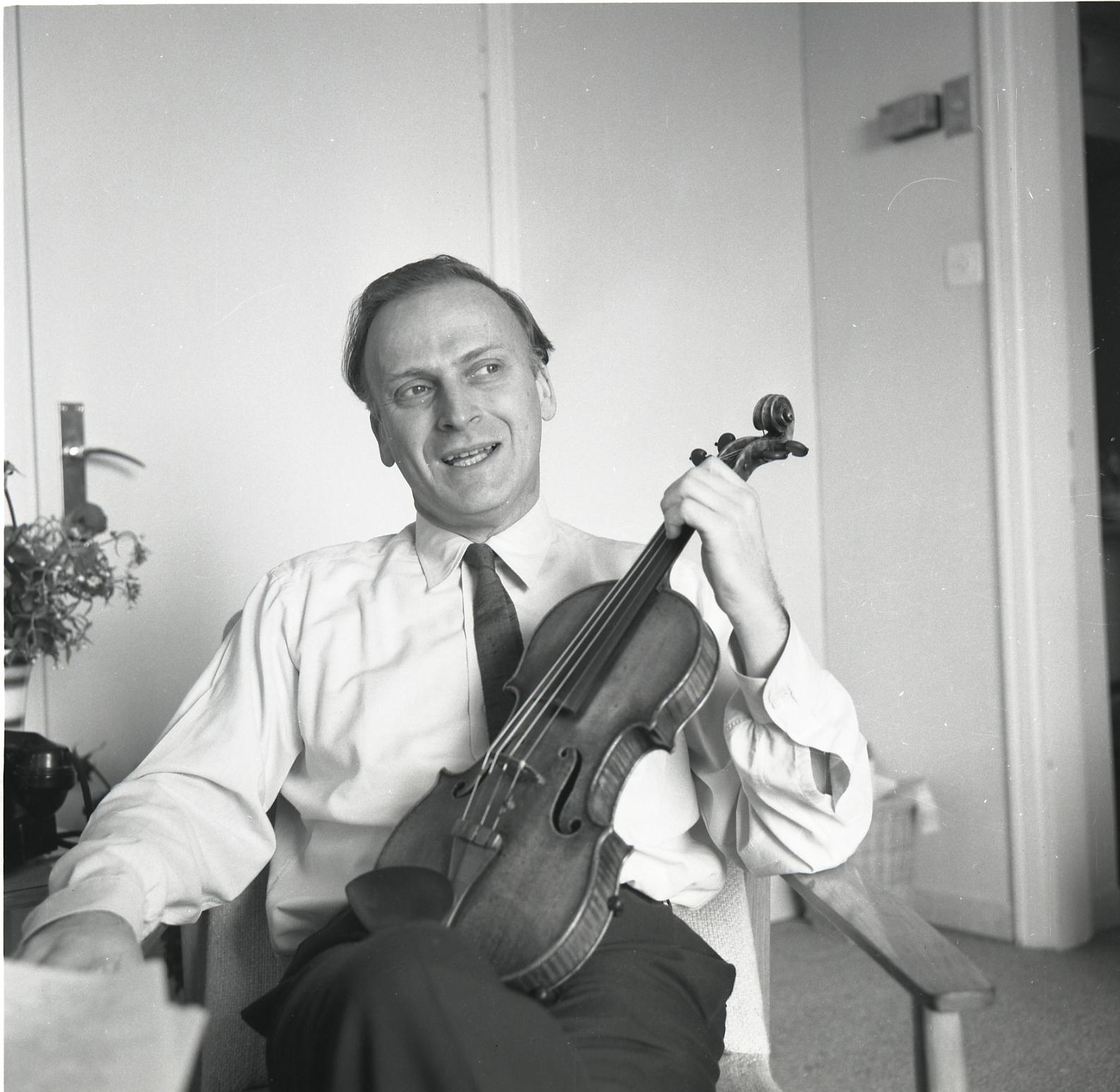
Menuhin also fostered close relationships with Soviet musicians, particularly those of Jewish descent. He actively assisted in arranging David Oistrakh's first visit to the United States and intervened with Soviet authorities to support Mstislav Rostropovich when the cellist faced harassment and travel restrictions due to his dissident views.
In 1975, as president of the International Music Council, Menuhin declared October 1 as International Music Day, which was first observed that same year. He was appointed a UNESCO Ambassador of Goodwill in 1992. Furthermore, Menuhin, along with Albert Einstein, was a sponsor of the Peoples' World Convention (also known as the Peoples' World Constituent Assembly), held in Geneva, Switzerland, from 1950 to 1951, reflecting his commitment to global cooperation and peace.
2.4. Education and charity
Menuhin was deeply committed to music education and social causes. In 1957, he founded the Menuhin Festival Gstaad in Gstaad, Switzerland. In 1962, he established the Yehudi Menuhin School in Stoke d'Abernon, Surrey, which has trained numerous prominent musicians, including Nigel Kennedy and Atef Halim. He also helped establish a new music curriculum at The Nueva School in Hillsborough, California. His only personal student, Alberto Lysy, whom Menuhin supported with a Rockefeller Foundation grant, later founded the International Menuhin Music Academy (IMMA) in Gstaad in Menuhin's honor.
In 1977, Menuhin co-founded the charity Live Music Now with Ian Stoutzker, which became the largest outreach music project in the UK. This organization trains and pays professional musicians to perform for communities, bringing live music to those who might otherwise lack access. In 1983, he and Robert Masters co-founded the Yehudi Menuhin International Competition for Young Violinists, which is now one of the world's leading platforms for emerging talent, with many prizewinners achieving international prominence, including Tasmin Little, Nikolaj Znaider, Ilya Gringolts, Julia Fischer, Daishin Kashimoto, and Ray Chen. In the 1980s, Menuhin also authored and oversaw a "Music Guides" series of books, each focusing on a different musical instrument or the human voice.
3. Philosophy and interests
Menuhin's intellectual curiosity and philosophical depth influenced his approach to life and music.
3.1. Yoga and spiritual world
Menuhin had a profound interest in the spiritual world and was a devoted practitioner of yoga. In 1953, Life magazine published photographs of him in various complex yoga positions, showcasing his dedication. In 1952, during a visit to India, he was introduced by Jawaharlal Nehru, India's first Prime Minister, to B.K.S. Iyengar, a yogi then largely unknown outside of India. Menuhin recognized Iyengar's talent and arranged for him to teach abroad in London, Switzerland, Paris, and other locations, thereby playing a crucial role in introducing Iyengar to the Western world and establishing him as one of the first prominent yoga masters teaching in the West. Menuhin also took lessons from Indra Devi, who founded the first yoga studio in the U.S. in Los Angeles in 1948. Both Iyengar and Devi were students of Krishnamacharya, a renowned yoga master in India. Menuhin's engagement with yoga and Zen meditation was partly driven by his efforts to overcome physical ailments caused by overwork during World War II and to address artistic challenges resulting from his less structured early musical education.
3.2. Philosophy and political views
Menuhin credited the German philosopher Constantin Brunner with providing him "a theoretical framework within which I could fit the events and experiences of life." Brunner's opposition to Zionism and his leanings towards Christian thought influenced Menuhin's own perspective, leading him to adopt an assimilationist stance more aligned with European culture, and showing less interest in the specific interests of Israel compared to some other Jewish musicians like Isaac Stern. According to Henry A. Murray, Menuhin wrote: "Actually, I was gazing in my usual state of being half absent in my own world and half in the present. I have usually been able to 'retire' in this way. I was also thinking that my life was tied up with the instrument and would I do it justice?"
Menuhin's political views were often nuanced and, at times, controversial. During his 1991 Wolf Prize acceptance speech in the Israeli Knesset, he openly criticized Israel's ongoing occupation of the West Bank. He stated that "This wasteful governing by fear, by contempt for the basic dignities of life, this steady asphyxiation of a dependent people, should be the very last means to be adopted by those who themselves know too well the awful significance, the unforgettable suffering of such an existence. It is unworthy of my great people, the Jews, who have striven to abide by a code of moral rectitude for some 5,000 years, who can create and achieve a society for themselves such as we see around us but can yet deny the sharing of its great qualities and benefits to those dwelling amongst them." This critical stance on Israeli policies persisted throughout his later life.
He also famously defended conductor Wilhelm Furtwängler, who had faced criticism for continuing to conduct in Germany during the Nazi era. Menuhin argued that Furtwängler had actively helped a number of Jewish musicians to flee Nazi Germany. However, Menuhin's support for the French left-wing philosopher Roger Garaudy, who later became a prominent Holocaust denier, caused significant controversy, highlighting a perceived contradiction in his public life. Menuhin also showed interest in the Maruyama vaccine.
3.3. Lifestyle
Menuhin maintained a pescetarian diet, a choice that was consistent with his broader philosophical outlook and his interest in holistic well-being.
4. Personal life
Menuhin was married twice. His first marriage was to Nola Nicholas, the daughter of an Australian industrialist and sister of his sister Hephzibah's first husband, Lindsay Nicholas. They had two children, Krov and Zamira, who later married pianist Fou Ts'ong. Their marriage ended in divorce in 1947.
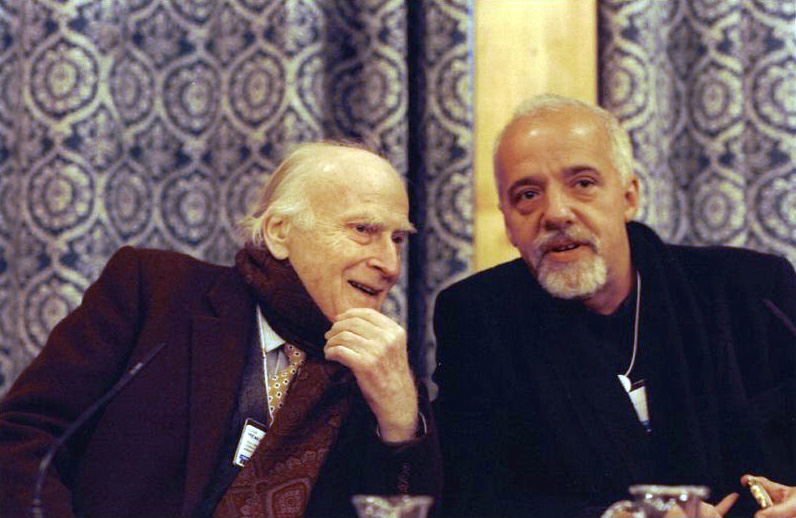
He then married the British ballerina and actress Diana Gould. Diana's mother was the pianist Evelyn Suart, and her stepfather was Admiral Sir Cecil Harcourt. With Diana, Menuhin had two sons: Gerard Menuhin, who later became known as a Holocaust denier and far-right activist, and Jeremy Menuhin, a pianist. A third child died shortly after birth. During the 1960s and 1970s, the couple resided in Highgate, London, at 2 The Grove, a house later owned by the musician Sting.
The name Yehudi means "Jew" in Hebrew. Menuhin recounted to New Internationalist magazine in 2004 that his mother chose the name after an antisemitic landlady mistakenly told his parents she did not rent to Jews. His mother vowed that her unborn baby would be named "The Jew" to proclaim his heritage to the world.
Menuhin became an honorary citizen of Switzerland in 1970 and subsequently a citizen of the United Kingdom in 1985, having given up his American citizenship.
5. Death and legacy
Yehudi Menuhin died on 12 March 1999, at the Martin Luther Hospital in Berlin, Germany, at the age of 82, due to complications from bronchitis.
Soon after his death, the Royal Academy of Music in London acquired the extensive Yehudi Menuhin Archive. This invaluable collection includes sheet music with his performance markings, a vast array of correspondence, news articles and photographs related to his life and career, autograph musical manuscripts, and several portraits of Niccolò Paganini. The acquisition was made possible by a significant grant of 1.20 M GBP from the Foyle Foundation, along with additional donations, ensuring the archive's preservation and wide accessibility to the public.
Menuhin's legacy endures through his vast discography, his groundbreaking educational institutions, his advocacy for peace and human rights, and his tireless efforts to promote music as a universal language for cultural understanding and reconciliation.
6. Assessment and criticism
Yehudi Menuhin's career and public life elicited widespread admiration for his musical prowess and humanitarian efforts, alongside some notable criticisms and controversies.
6.1. Positive assessment
Menuhin is universally praised for his musical genius, recognized as one of the most gifted violinists of the 20th century. His performances were characterized by exceptional technical mastery, profound musicality, and a deep emotional connection to the repertoire. Beyond his individual artistry, he is highly regarded for his extensive humanitarian efforts, particularly his performances for Allied soldiers during World War II and for concentration camp survivors, which demonstrated his compassion and commitment to healing. His post-war reconciliation concerts in Germany, despite the controversy they generated, were seen by many as courageous acts aimed at fostering peace and understanding.
His significant impact on music education is another cornerstone of his positive assessment. The founding of the Yehudi Menuhin School and the International Menuhin Music Academy, along with the Yehudi Menuhin International Competition for Young Violinists, reflects his dedication to nurturing young talent and ensuring the future of classical music. His initiatives like Live Music Now further highlight his commitment to making music accessible to broader communities, emphasizing its social and therapeutic benefits. His role in establishing International Music Day also underscores his vision for cultural unity through music.
6.2. Criticism and controversy
Despite his widespread acclaim, Menuhin faced criticism for certain political statements and actions. His decision to perform in Germany with Wilhelm Furtwängler after World War II, while seen by Menuhin as an act of reconciliation, drew significant condemnation from some Jewish communities who felt it was premature or disrespectful given Furtwängler's association with the Nazi regime, even though Menuhin maintained Furtwängler had aided Jewish musicians.
Another major controversy arose from his support for Roger Garaudy, a French philosopher who became a prominent Holocaust denier. Menuhin's endorsement of Garaudy's views, even if stemming from a broader philosophical stance, was widely criticized and seen as a profound contradiction to his own Jewish heritage and his earlier humanitarian work with Holocaust survivors. This incident, along with his critical stance on Israeli policies expressed during his Wolf Prize acceptance speech, led to accusations of being out of touch or even anti-Semitic by some, despite his deep personal connection to his Jewish identity. These instances highlight the complexities of Menuhin's public persona, where his pursuit of universal humanism sometimes led to positions that were deeply unsettling to segments of the public, particularly those concerned with historical justice and human rights.
7. Awards and honors
Yehudi Menuhin received numerous national and international awards, honorary degrees, and titles throughout his distinguished career:
- Appointed an honorary Knight Commander of the Order of the British Empire (KBE) in 1965. As an American citizen at the time, this was an honorary knighthood. Upon becoming a British citizen in 1985, the knighthood became substantive, entitling him to use the style 'Sir'.
- Received the Freedom of the City of Edinburgh, Scotland, in 1965, and later also of Bath, Reims, and Warsaw.
- Awarded the Jawaharlal Nehru Award for International Understanding in 1968.
- Served as President of the International Music Council from 1969 to 1975.
- Became President of Trinity College of Music in 1970.
- Received the Léonie Sonning Music Prize in Denmark in 1972.
- Nominated as president of the Elgar Society in 1983.
- Awarded the Ernst von Siemens Music Prize in 1984.
- Received the Kennedy Center Honors in 1986.
- Appointed as a member of the Order of Merit (OM) in 1987.
- His recording of Edward Elgar's Cello Concerto in E minor with Julian Lloyd Webber won the 1987 BRIT Award for Best British Classical Recording.
- Received the Glenn Gould Prize in 1990, in recognition of his lifetime contributions.
- Awarded the Wolf Prize in Arts in 1991.
- Appointed a UNESCO Ambassador of Goodwill in 1992.
- On 19 July 1993, Menuhin was made a life peer, taking the title Baron Menuhin, of Stoke d'Abernon in the County of Surrey.
- Received the Sangeet Natak Akademi Fellowship, the highest honor conferred by Sangeet Natak Akademi, India's National Academy for Music, Dance and Drama, in 1994.
- Awarded the Konex Decoration by the Konex Foundation in Argentina in 1994.
- Received the Otto Hahn Peace Medal in Gold of the United Nations Association of Germany (DGVN) in Berlin in 1997.
- Received honorary doctorates from 20 universities, including Oxford, Cambridge, St Andrews, Vrije Universiteit Brussel, the University of Bath, and Kalamazoo College.
- The concert and performance hall at the European Parliament in Brussels is named the "Yehudi Menuhin Space".
- Held the Gold Medals of the cities of Paris, New York, and Jerusalem.
- Elected an Honorary Fellow of Fitzwilliam College in 1991.
- Received the 1997 Prince of Asturias Award in the Concord category, sharing it with Russian cellist Mstislav Rostropovich.
- Received the Grand Cross 1st class of the Order of Merit of the Federal Republic of Germany in 1997.
- On 15 May 1998, he received the Grand Cross of the Order of Saint James of the Sword from Portugal.
- Awarded the German Book Trade Peace Prize in 1979.
- Received the Albert Medal in 1981.
8. Cultural references
Yehudi Menuhin's widespread fame led to several appearances and mentions in popular culture:
- The catchphrase "Who's Yehoodi?", popular in the 1930s and 1940s, was inspired by Menuhin's guest appearance on a radio show where Jerry Colonna turned "Yehoodi" into a widely recognized slang term for a mysteriously absent person. The phrase eventually lost its original connection to Menuhin.
- Menuhin was scheduled to appear on The 1971 Morecambe and Wise Christmas Show but was unable to, as he was "opening at the Argyle Theatre, Birkenhead in Old King Cole." He was humorously replaced by Eric Morecambe in the famous "Grieg's Piano Concerto by Grieg" sketch featuring conductor André Previn. He was also invited to appear on their 1973 Christmas Show to play his "banjo," to which he ruefully responded that he "can't help you."
- A picture of Menuhin as a child is sometimes used as part of a Thematic Apperception Test.
- A children's book titled Boy and the Violin ~ A Gift from the God of Music~ (Japanese: 少年とバイオリン~音楽の神様からの贈り物~Shōnen to Baiorin ~ Ongaku no Kamisama kara no Okurimono~Japanese) was published, based on the anecdote of him gifting a violin to a shoeshine boy in Japan.
8.1. Films
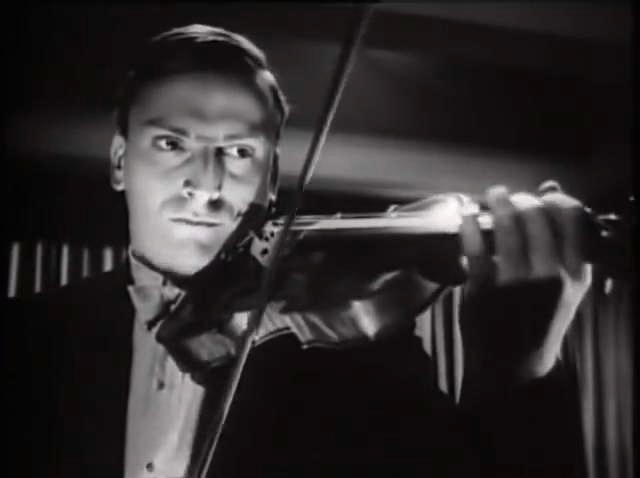
- 1943 - Menuhin was a featured performer in the film Stage Door Canteen. Introduced as "Mr. Menuhin," he performed two violin solos, "Ave Maria" and "Flight of the Bumble Bee."
- 1946 - Menuhin supplied the violin solos in the film The Magic Bow.
- 1979 - The Music of Man (television series).
- The Mind of Music.
9. Instruments
Yehudi Menuhin played a number of historically significant violins throughout his career. Among the most renowned was the Lord Wilton Guarnerius 1742. Other notable instruments he played included the Giovanni Bussetto 1680, Giovanni Grancino 1695, Guarneri filius Andrea 1703, the Soil Stradivarius, the Prince Khevenhüller 1733 Stradivari, and the Guarneri del Gesù 1739.
In his autobiography Unfinished Journey, Menuhin articulated his deep connection to these instruments: "A great violin is alive; its very shape embodies its maker's intentions, and its wood stores the history, or the soul, of its successive owners. I never play without feeling that I have released or, alas, violated spirits."